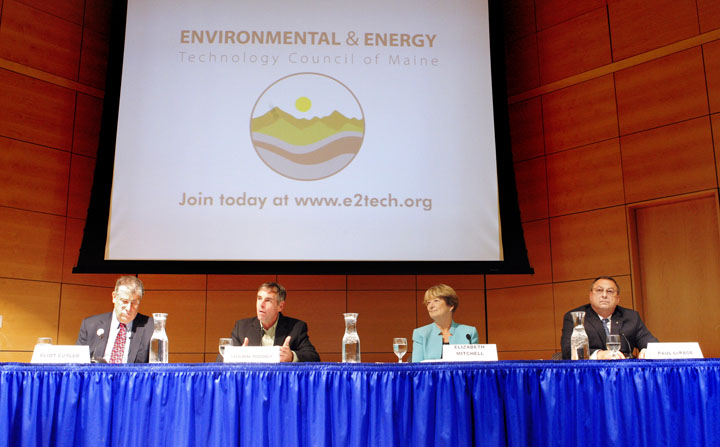PORTLAND — Maine’s gubernatorial candidates outlined their positions on offshore oil drilling, Canadian power, wind farm development and strategies to lower electricity costs during a debate today in front of a gathering of energy and environmental professionals.
The debate took place at the University of Southern Maine before members of the Environmental & Energy Technology Council of Maine.
The forum served to sharpen the distinctions between the Republican front runner in polls, Paul LePage, who favors less government involvement and regulation, and his Democratic challenger, Libby Mitchell, who sees a stronger role for government to encourage Maine’s transition to a green economy. It also highlighted specific plans by Eliot Cutler, one of three independent candidates, to create a public power authority to partner with industry to build lower-cost energy projects, and the small business, high-efficiency focus of Shawn Moody.
The third independent candidate, Kevin Scott, was unable to attend.
The next governor will lead a state where eight in 10 homes are heated with oil, and high power costs are considered a deterrent to attracting and retaining business. While he or she won’t be able to single-handedly change these long-standing conditions, the next governor will appoint environmental and utility regulators, and help set policy directions that will influence the price of energy and the development climate in Maine for years to come.
Questions for the candidates came from Jeff Thaler, an environmental lawyer and council co-chair, who moderated the two-hour event, as well as members of the audience.
Maine’s Legislature set ambitious goals for wind power development, both inland and offshore. The candidates were asked if they support those goals. Only LePage said he would not, citing concerns for the need for back-up generation when the wind isn’t blowing. Moody said it makes sense to continue with these investments. Mitchell, who helped draft the goals as Senate President, agreed. Cutler said he’d like to see other ocean resources examined, in addition to wind.
The merits of water power, both here and in Canada, came under discussion, as did the potential for drilling for oil and gas in the Gulf of Maine. Some of the responses seemed more symbolic than realistic.
For instance: Both Moody and LePage expressed the desire to develop and upgrade the state’s small hydroelectric dams. Roughly 18 percent of Maine’s 3,300 megawatts in generation capacity comes from water power, but Thaler noted that small hydro plants produce only a fraction of that. LePage, however, said he favored these generators and added: “We keep taking our dams out.”
LePage’s reference was to the 3.5-megawatt Edwards Dam in Augusta, which was removed in 1999, and the 1.5-megawatt Fort Halifax Dam in Winslow, taken down in 2008. The state approved their removals to improve fish habitat, noting that they produced very little energy, roughly one-thousandth of the state’s demand.
Regarding offshore drilling, Mitchell, Moody and Cutler said they wouldn’t consider it. Cutler called the idea “absolutely nuts.” And Thaler noted that Maine’s state geologist found no potential for oil or gas deposits in state waters. LePage, however, said he would “never say never.”
Discussing the merits of Hydro Quebec proved to be of more substance, and underscored a clear policy decision that will be facing Maine’s next governor.
The giant Canadian utility already has transmission lines into New York and New England. Maine’s last Legislature set up rules for developers wanting to build new energy corridors through the state.
If Maine could negotiate low-priced contracts, LePage said, that would be “a no brainer.” But Mitchell pointed out that Canadian power could undercut Maine’s young renewables industry. It would be shortsighted, she said, to discourage the growth of local energy producers in favor of Hydro Quebec. Cutler took a middle position, saying Maine can’t act as an island that generates all its own power and should import some power from Canada.
The candidates also had different views on how to structure environmental regulation. In addition to the Department of Environmental Protection, Maine has a citizen board that reviews applications. Mitchell wants to retain the Board of Environmental Protection. Cutler said the current process needs reform. LePage stood by an earlier statement that he would consider moving the functions of the DEP into the Department of Agriculture. Private owners are better stewards of a resource, he said, using an example of farmers in Aroostook County.
The candidates also were asked if they’ll support a $9.75 million bond question on the Nov. 2, ballot, which attracts matching federal money for land conservation. Only LePage said he would not.
“I look at bonds as another form of taxation,” he said.
Send questions/comments to the editors.




Success. Please wait for the page to reload. If the page does not reload within 5 seconds, please refresh the page.
Enter your email and password to access comments.
Hi, to comment on stories you must . This profile is in addition to your subscription and website login.
Already have a commenting profile? .
Invalid username/password.
Please check your email to confirm and complete your registration.
Only subscribers are eligible to post comments. Please subscribe or login first for digital access. Here’s why.
Use the form below to reset your password. When you've submitted your account email, we will send an email with a reset code.